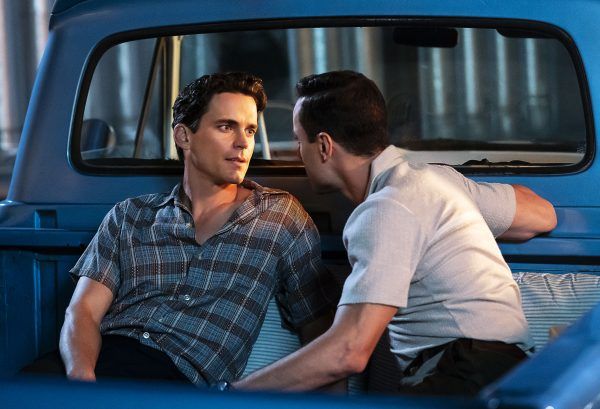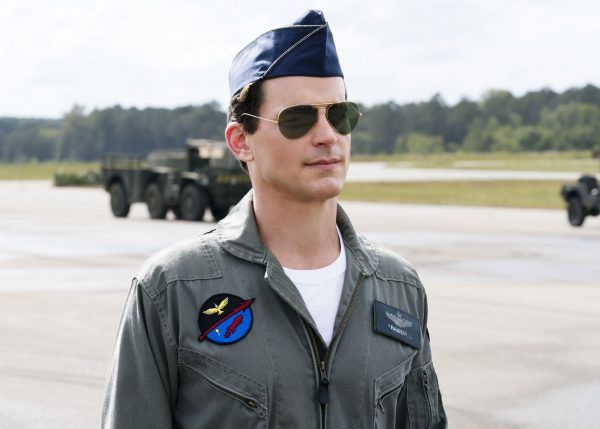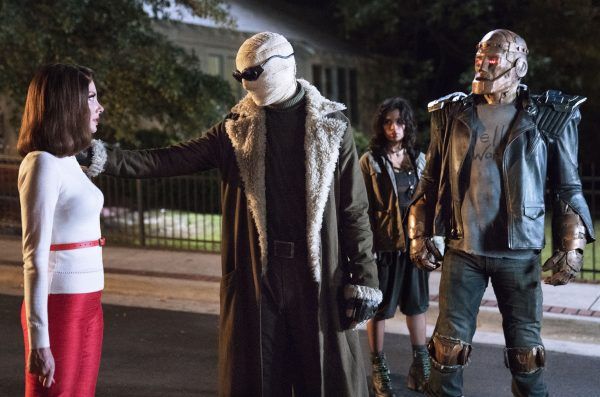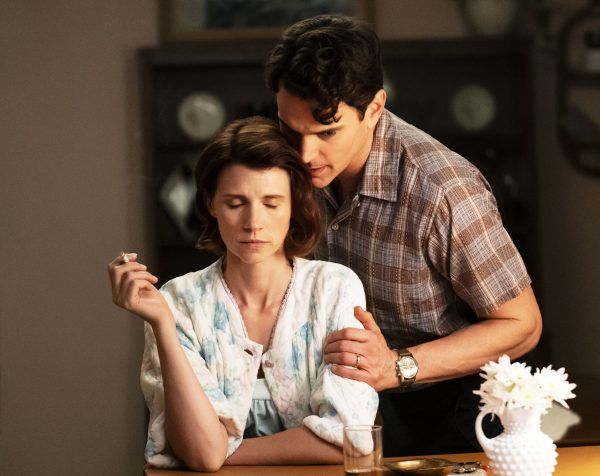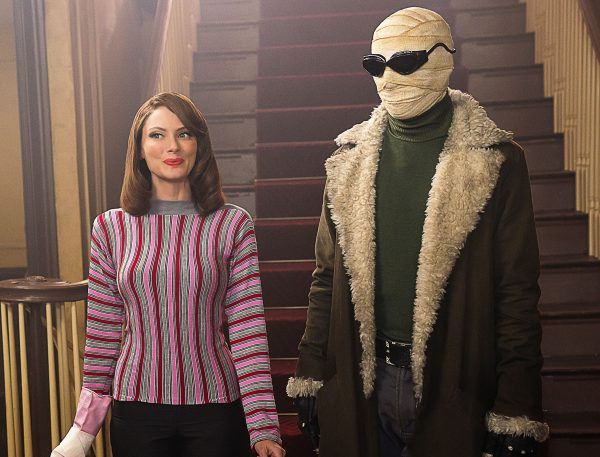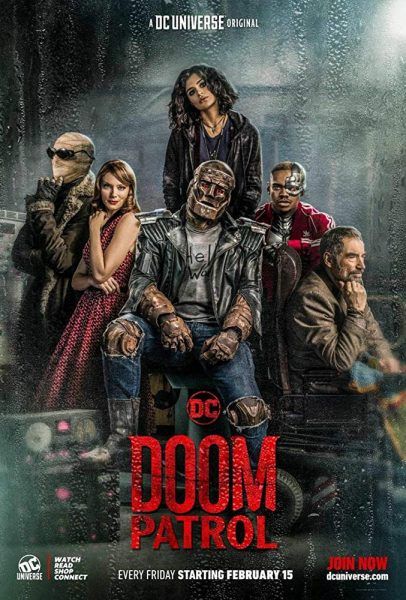From showrunner Jeremy Carver, the TV series Doom Patrol (available to stream at www.DCUniverse.com) follows a team of uniquely quirky and downright odd superheroes who have all suffered a horrible accident that’s given them abilities, leaving them more anti hero than anti-hero, as they work together to find their purpose while investigating weird phenomena. After bringing together Robotman, aka Cliff Steele (Brendan Fraser), Negative Man, aka Larry Trainor (Matt Bomer), Elasti-Woman, aka Rita Farr (April Bowlby), and Crazy Jane (Diane Guerrero), mad scientist Niles Caulder, aka The Chief (Timothy Dalton), mysteriously disappears and Cyborg (Joivan Wade) presents them with a mission that will force them to face their own fears, if they are to succeed.
Following a screening of Episode 3, entitled “Puppet Patrol,” actor Matt Bomer held a Q&A for select press at the Soho House in West Hollywood and talked about his love for DC Comics, not being familiar with the Doom Patrol comics before signing on for the series, why he thinks Larry Trainor is an important character in the superhero genre, sharing the role with another performer, which member of the Doom Patrol his character is closest to, the weirdest moments he’s had this season, and what he’s excited about fans getting to see, in the coming episodes.
Question: How familiar were you with this comic book, before taking on the project?
MATT BOMER: I wasn’t familiar with (these comics), at all. I grew up with pretty standard comic book fare, as a kid. I was definitely more of a DC kid, but I did not know about Grant Morrison’s comics, or even the ones that predated that. (Executive Producers) Greg Berlanti and Jeremy Carver called me and described this character to me, who they felt, on the outside, was this all-American, Chuck Yeager, golden boy, but on the inside, was one part the Elephant Man and one part Montgomery Clift. I thought, “Oh, wow, that’s a really interesting dichotomy to get to play.” He’s this golden boy on the outside, but inside, he’s always felt like a monster. It’s the great allegory of the role that Jeremy so brilliantly came up with. Through this accident, he ultimately becomes what he always felt he was inside. So, his journey over the course of the season is finding a dialogue with himself, where he can learn to accept all of the parts of himself that he felt were unlovable or unacceptable, in the past.
Going into this role, were you prepared for just how wacky this show would be?
BOMER: That’s actually why I loved it. I’ve certainly read my share of comic book scripts, over the years, and if this had just been another formulaic, down-the-middle, noir-ish, dark, all straight-faced, traditional, Gotham-y type of series, I would not have been a part of it. Especially in the landscape, in this day and age, to stand out, you need to be distinctive, and reading this script, you can call it whatever you want to, but it is absolutely distinctive and its own beast, unabashedly so. A big reason why I wanted to be a part of it is because it’s so strange. Reading the pilot, I only got a small snippet of it. It wasn’t really until I got into the Grant Morrison comics, and then the subsequent authors after that, that I went, “Holy shit! Did everybody just do LSD, and then just throw spaghetti against the wall? How did they come up with this?” That trippy, abstract, absurdist tone is what I love about the piece. It may be one of those things that you love or you hate, but for me, it’s what I loved about it.
You’re a DC fan who’s been circled some superhero roles before . . .
BOMER: For a couple of decades, yeah.
And you’ve voiced an animated superhero. Now that you are physically in the DC universe, how does that feel, and what’s it like to have this great, meaty character to be playing?
BOMER: I have to say that I’m so happy this is where it all ended up. I love Larry. I love who he is, and I love who he is going to become. I love who he is in the process of becoming. People always say, “What about Superman?” They bring it up to me, constantly, still. This character, to me, is just as, if not more, interesting than Superman. I’m really, really happy with where it landed. I think (showrunner) Jeremy Carver is a brilliant writer, and I’m constantly surprised by the writers on this project, and also by the scope of their ambition, and the fact that these production designers and special effects teams are able to make this happen, week to week. This is such a huge operation. I had no idea, when I signed on, just how vast it would be. I got on the set, the first day, and they had built an X-15 for me to fly and I thought, “Oh, shit, this is real. They’re really putting it all into this.” I’m so happy to be in the DC universe still, after all of these years, and I’m so happy with the role that I landed.
As a gay actor, how does it feel for you to bring gay representation to the superhero genre, especially because we haven’t seen storylines like this in mainstream superhero movies yet?
BOMER: I think it’s so important. It’s a big reason why I wanted to be a part of Doom Patrol. I’ve never really seen a gay, male superhero, and what I love most about the character is that, even though it’s a huge struggle, internally, for him, it’s not the sole thing that defines who he is. He’s such a multi-faceted character. If it had just been one stereotypical thing, I think I would have had more reservations about it, but the fact that he is this nuanced character who has so many places to grow, and he has so much shadow and so much light that he doesn’t even know he has, is what appealed to me, just as much as his sexuality.
A lot of people can relate to a character’s who’s hiding a part of himself. How does it feel, as an actor, to be exploring this story?
BOMER: Interestingly enough, one of the reasons they first called me (for this role) is that I was doing Boys in the Band on Broadway, which takes place in ‘68/‘69, at a time when, even if people were accepting of who they were, they had to do it behind closed doors. You couldn’t even really do it in public. The bar you were in could be raided. You were certainly ostracized by the mainstream community. It wasn’t like it is today. So, I was in that headspace and Greg [Berlanti] had come to see the play, and they called me a little bit after that. I think he knew that I had really been delving into that world, eight times a week on stage, but for Larry, the stakes are even higher. It’s one thing to just be a product of that time, but to also be in the military, actively serving and to be someone who has tried to achieve so much, in order to create a smokescreen for himself and to give himself permission just to be. In his mind, if he can just become this guy who breaks the sound barrier and America has to love him, then he’ll never have to really deal with the parts of himself that are unlovable.
You share the physicality of this role with another performer. What’s that experience like? Have you tried to do anything to create a continuity between your performances?
BOMER: I wish that we had. I wish I could say that we did some mime workshop together, or something. I would have been game to do it, in spades, believe me. It was just the nature of the piece that, due to schedules and how it all worked out, it was more Matthew Zuk, who is phenomenal and does the physical work. We correspond via email, phone call and text, and then, whenever I’m down in Atlanta, we spend a good amount of time together and talk about the character. It’s really unique. It’s not like voicing animation, where you voice the role, and then they animate to you, and you go back and do a polish. It’s really a true collaboration, in that I just throw spaghetti at the wall, he does his stuff, and we go back and polish it, at the end. There’s no precedent for it. I don’t know that anybody’s ever really done something like this before, so we’re still figuring out the best way to do it. I love it. It’s a really unique challenge that I’ve never faced before. I don’t know any other actor who’s ever shared a role, physically, with somebody else, but then also come in and embody it, at certain points.
Not only is your role played by two actors, but Cliff Steele is also played by two actors. Have you and Brendan Fraser shared any notes on how you’re doing the voices?
BOMER: It’s a bit of a disparate production, just because there are often two units going on, at the same time. I think that I’ve only been in the same room as Brendan one time, just because of the nature of how it all shakes out. And that was in the trailer, after an 18-hour day, when I was getting the silicone pieces pulled off my face. Other than that, we did a Skype cast read-through for the pilot, and that was really it. So, I look forward to seeing more of the cast. It’s like American Horror Story, in that you end up working largely with the actors who are involved directly in your storyline, and the actors who aren’t in your storyline, you may not see, ever. It’s been nice, when I get down to Atlanta, to spend some time with April [Bowlby], Diane [Guerrero], Timothy Dalton, Matthew [Zuk], and some other folks down there. I look forward to getting to know them more, as time goes on.
How much do you think Larry’s disconnect with his family, in the present day, informs him now, compared to someone like Cliff, whose disconnect with his daughter is one of the big motivations for him?
BOMER: I think he’s really compartmentalized it. He really wanted his cake and to eat it, too. It’s really profoundly important for him to be able to keep his wife and family, not only because of the primal love and need for them, but also because they secure his status and his place in the military. He also, obviously, really, really loves John, and that’s maybe the only true romantic connection that he’s ever had. He wants them both, but he can only have them, if he really compartmentalizes them. He doesn’t realize a lot of that until it’s too late and they’re both gone, and he’s had 50 years to let all of these feelings marinate. He still hasn’t been able to deal with himself. He’s created hobbies for himself, around Doom Manor, like gardening. He really is still a wallflower, after all of this time. It’s not until the impetus of the pilot and the circumstances that happen that force him into action that he really has to start actively dealing with himself, and that continues to grow, over the course of the season. There’s an episode coming up, where it all really starts to come to a head for him and the group, and he has to really start to get in touch with who he is, authentically.
If Larry ever comes to terms with who he is and becomes comfortable with himself, do you think he’ll ever look up and see what happened to his children, or to John?
BOMER: At this point in time, he doesn’t want to burden them with who he is. He almost feels that it’s easier for them to believe that he’s gone than to try to explain who he is now. The hardest part of it is that he can never remove the bandages and look them eye to eye ‘cause he’s so radioactive. Even if he were to see them, they’d only get to see the mummified version of their dad. But, that could always change. There are still lots of episodes to go.
Are we going to see more flashbacks to Larry’s time in the Air Force, as the season goes on?
BOMER: Yes, you do. In the nature of Grant Morrison and Doom Patrol, some of it is a bit absurdist, a little abstract, and off-kilter, so it’s not like Full Metal Jacket, or anything, but you will continue to see him in flashbacks, throughout the season.
Much like Crazy Jane and Robotman have become close, is there a character that Larry feels closest to?
BOMER: I think Crazy Jane and Robotman have a borderline romance. It’s not really just a friendship. Obviously, there are circumstantial bits that may prevent it from ever being consummated, but I don’t know because Dr. Niles Caulder is pretty creative. It just seems to be a great romance. It’s a meet-cute, awkward, he said/she said, I love you/I hate you situation, and it’s so perfectly written because any one of her personalities can come up, at any time, to basically say, “Fuck you,” and walk away. In terms of the team, the person Larry is closest to is Rita. He seems to really innately understand her. He has a good beat on who she is, what her history is, and what kind of pain and pathos she carries around with her, and he has a real empathy and connection with her. Of all the people there, she probably has a good understanding of who he is and what he may be hiding. Back in that time, it was very common for people, like my grandmother, to say,”Oh, he’s a bachelor.” I feel like Rita has probably worked with a few “bachelors” over her time in the movie industry, and they probably helped her out, from time to time, so I think she understands who Larry is, and they probably don’t have to talk about it. They can just spend time together and watch her old movies, and he can be a fan, and they can enjoy their time together.
Will there be a point where these characters have to confront their immortality?
BOMER: I think when we all find that out, the shit is really gonna hit the fan. I don’t know when that’s gonna be, but Rita and Larry struggle with being stuck in the same gear for 50 years. For Rita, it’s been even longer. They are in this perpetual state of entropy, and it’s not really until they’re forced to go out into the world, that they can actually start to accelerate and move past this icky, sticky singular place that they’ve been in for so long. In terms of their immortality, I think that’s a different story. It’s curious, and it is addressed, at times. For Larry, he’s immortal, but he looks like he does. He’s just figuring out what his purpose is and what function he serves in this group, and how he can use this thing inside of him to accomplish what he was never able to accomplish when he was an Air Force pilot.
Has there been any wacky or weird element of the show that’s been your favorite, so far, to bring to life?
BOMER: It’s pretty fucking weird to go down a donkey’s throat. I thought, “Okay, I’m going down a flatulent donkey’s throat!” Honestly, I love abstract and absurd. I love Salvador Dali. I love things that think outside the box that way, and that challenge us. These directors on the show are so phenomenal at realizing these visions, as well as the production designers. One of the more absurd things, for me, are the scenes where I’m confronting the spirit in the show and it’s just me. (For Episode 3), it was almost 100 degrees on that soundstage, and it was just me and a green screen. There was nothing there. I didn’t have a template, other than the comics, for what the spirit looked like. There wasn’t even a tennis ball for me to look at. It was just a green piece of fabric and a green catwalk, and they were like, “Okay, now it’s over here. Now, it’s up in your face.” And there were 40 people, sitting there and watching you while you’re basically just having to try to be a five-year-old kid playing in the sandbox, acting like no one is watching. To me, that’s pretty absurd and absurdist. I’d done some green screen work before, but I always had at least something to act off of. I don’t think anyone was even reading its lines back to me. It was just me and some green.
There’s a big difference between the Doom Patrol episode of Titans and the Doom Patrol series. How did you adjust for that?
BOMER: I took the given circumstances in direction from one director, and I took the given circumstances in direction from another director/creator. A lot of these showrunners, who are huge comic book fans, are basically becoming the latest iteration of a writer/illustrator team, to make their interpretation of a comic. It’s the same way someone else reinterpreted Doom Patrol, after Grant Morrison. They’re doing the same thing, in cinematic form. So, the Titans version of Larry was this upbeat guy, moon-walking in the kitchen, and who has a quip for everything. He was funny while Jeremy’s version is self-loathing. He’s holding an incredible amount of pain and pathos, at all times. He doesn’t know how to really connect with anybody. He doesn’t know how to connect with himself. They’re just two radically different interpretations of the same character, and my job is always how I can serve the project. That’s really what any actor’s job should be, on a project. It’s not about how I can serve myself, but how I can serve the story. In terms of what Jeremy wanted, this is what he wanted for the character.
What can you say about the journey that Larry takes, this season?
BOMER: It’s tough to get into specifics without spoiling anything or giving away key plot points that several people would string me up for, but a lot of it is about finding his voice and being able to come to terms with his sexuality, who he is, how he can help, what this being inside him is, what it represents, how it wants to communicate with him, and why it wants to communicate with him. Does he want it to stick around? Does he want it to leave? Can he ever have any real control over it? Is the only way to have control over it to ultimately, for the first time in his life, let go of control because he has been such a control freak? He’s really face-to-face with his ego, and all of the fears and insecurities that entails, and he has to let go, in order to supersede that and really find a purpose for his existence, after all these years.
What are you most excited for people to see, in the next few episodes?
BOMER: Oh, my gosh, there’s so much. I wish I could just distill it down to one or two things, but literally with every script, the first thing I thought was, “How the fuck are they gonna do that?” And then, they did. There are just so many abstract elements that they’ve pulled, either from Grant Morrison’s files or Jeremy’s original creations, and you get the history of where Larry went, before he got to the Doom Patrol. That ends up playing a role in the story, as well. It’s just so wildly imaginative. I just want people to see the show because I truly think it’s really special, and I don’t say that about every show that I’ve done. It’s got an incredible creative team and an incredible production team, and as bizarre and wacko as it gets, at times, it’s got an incredible heart, underneath it all. They’ve really gone to painstaking lengths to make these characters really human, and to have real darkness and light and struggle to get to where they are, by the end of the season.
Doom Patrol is available to stream at www.DCUniverse.com.


